
Find the Right People for Your Company
Culture Fit Interview QuestionsThe best employees are those who not only know how to do the job they've been hired for, they are also totally bought into the culture you've created at your company. But in such a hyper-competitive job market -- where unemployment is at record lows -- how do you find those diamonds in the rough?
Natalie has been integrating, training, and strengthening employees’ cultural connections with IMPACT for almost 5 years. As the third most tenured employee, her career at the agency has spanned multiple roles including social media manager, director of client services, and process development manager. In her current role as the director of talent, Natalie engages in all aspects of employee experience. Working on the leadership team, she has played a key role in developing and discovering IMPACT’s core values, vision, and culture code. Some of her key initiatives have been designing IMPACT’s cultural orientation and training process, developing a more expansive Human Resources department, and building an ongoing employee appreciation plan.
Fill out the form for a downloadable PDF version of the guide you can reference later.
Chapter 1
Company culture is a hot topic right now. Companies that understand its importance are working to create the best work culture in order to attract and retain top talent. But not just any talent. Companies that want to maintain their great cultures know that they can’t just hire for skill, they also have to hire for culture fit.
But what is this “culture fit” we speak of?
According to Business News Daily, “cultural fit means that employees' beliefs and behaviors are in alignment with their employer's core values and company culture.”
In plainer terms, those you find who are a "culture fit" with your company are people who are bought into the direction of your company and would fit in (and thrive) in your work environment. Someone who fits well in a work environment will go above and beyond to be a valuable asset so they can stay there.
Applicants are constantly telling me that finding the right culture in a company is their top deciding factor when choosing a new place of employment. It’s evident that it’s not easy to find the right fit, so when they do they’ll be loyal contributors.
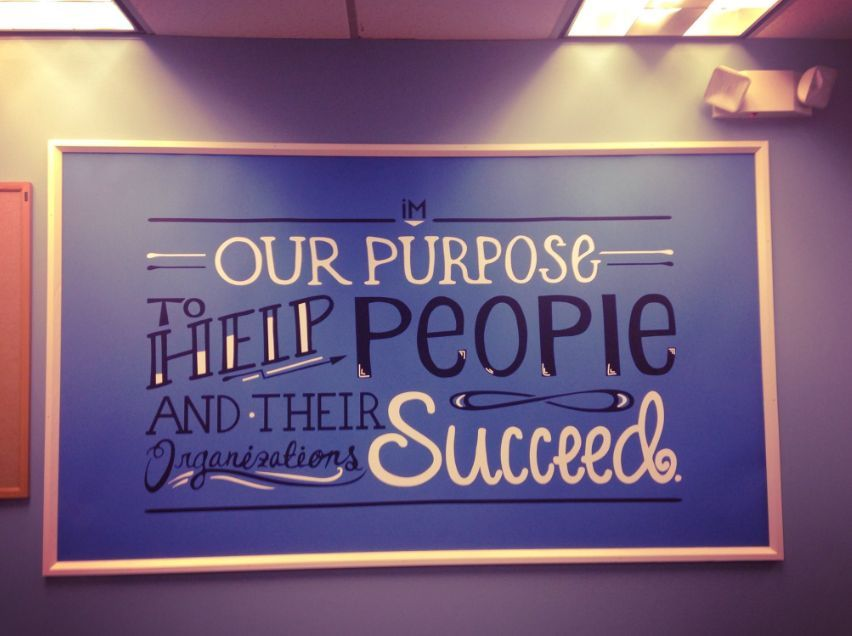
IMPACT's company purpose, as illustrated by our very own Marcella Jalbert.🎨
OK, so now that we understand what culture fit is, why is it something we need to focus on?

"When bringing someone onto the team, we're looking for individuals who see IMPACT as more than a stepping stone. Somewhere they can grow. A place where you're not simply an employee but a leader and friend. A lot of that comes from the alignment of shared values and culture fit. You'll find that employees who live and breathe your company culture are highly engaged and recruiting top talent for you."
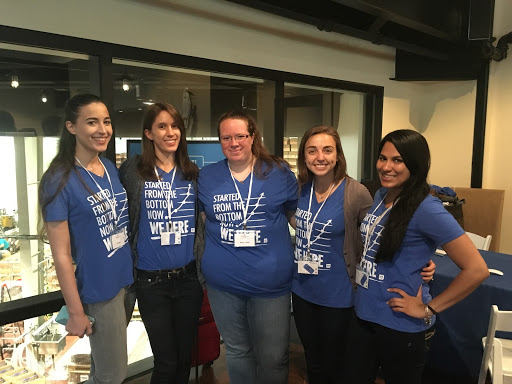
When a person who’s a bad culture fit sneaks through the cracks of your hiring process, it can have some big impacts on your organization.
According to the U.S. Department of Labor, “the price of a bad hire is at least 30 percent of the employee's first-year earnings.” Couple that with the person’s salary, and you’re looking at a big financial hit to the business.
Not only does a bad hire cost a business a lot of money, they can also create a toxic work environment.
Someone who isn’t a good culture fit can affect the team’s morale, productivity, and overall happiness. Because of this, you might start to lose some of your better people simply because this bad hire brought them down and burned them out.
Unfortunately, we have first-hand experience with this.
Back in the day at IMPACT, we had one employee that spread negativity and created a subculture against leadership. This person encouraged people to be unproductive, to go against management decisions, and generally didn’t want to see the company succeed. We let it go on for so long that we eventually had to let a group of people go in order to try to salvage what was left of the good culture.

“It was a very awkward time in the office. There was a lot of tension on the main floor and in meetings that brought a negative tone to everything. Because it was so obvious and awkward, I understood exactly why the group needed to be let go to cut out the counterculture even though it was hard to see a few people you work closely with leaving the company.”
The situation continued to spiral, to the point where 65% of our team turned over that year.
As a result, we made a point to reassess what we looked for in employees, and how we did our hiring. Today, we make sure to address any culture issues immediately and head-on before they have a chance to spread too far.
Culture Fit, Schmulture Fit
Chapter 2
Hiring for culture fit is not just about the questions you ask in the interviews, it should be worked into your entire hiring process. In addition, you don’t always have to be the one making the call. You can actually do a few things to let candidates qualify and disqualify themselves.
Starting with our careers page, we put the following things on there, so people can determine if IMPACT is the place for them.
We use real photos of our team -- never stock photos! -- to show off the personalities of our team members and some of the activities that we do. This allows people to evaluate if they see themselves working with those people and enjoying the environment.
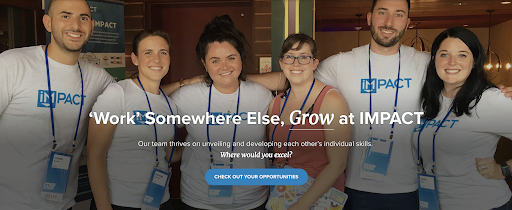
Everyone at IMPACT is on board with and working towards our company mission statement. If this doesn’t excite people when they read it IMPACT probably isn’t the place for them.

We proudly show off our core values, a mandatory requirement for people who join our team. Clearly defining them allows people to determine if these are values they believe in as well.
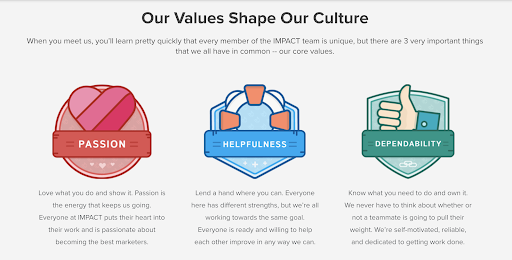
Our culture code (shown below) tells the full story of IMPACT. From our history to our plan for the future and everything in between. Very importantly, it dives deep into what an IMPACT employee looks like and the types of people who work here.
CultureTalk.com says:
“A culture code is a detailed document (often a presentation) that outlines the culture of your organization. It covers your company’s motivations and inspirations, the common drivers and passions that unite your team and define your cumulative culture (think less employee handbook and more, ‘unwritten rules’ of engagement).”
All in all, a culture code gives people a glimpse of your company’s story and what it’s like to work there. Companies share this with their employees, potential employees, and even clients.
A few years back, we decided to redo our culture code so it would represent the IMPACT we had become, not the one we were when the company started. (You’d be surprised how much things have changed!)
We wanted to be as transparent as possible, and not sugarcoat any of the difficult times the company had been through. This was important to us so anyone looking through the presentation would know what we’re all about, but that we’re not perfect.
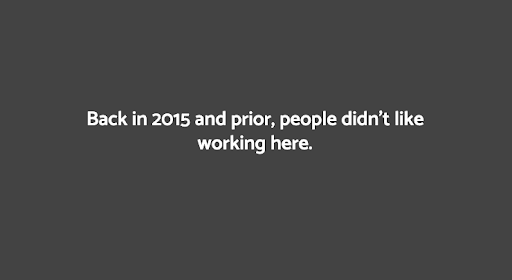
One of my favorite incredibly honest slides from our culture code.
The last thing we want is someone coming on our team and expecting that we have all the answers. Things are constantly changing and evolving, so we count on new people to join in and help us stay above the curve, and we need people who are bought-in to an environment like that.
If done correctly, your careers page and culture code should clearly spell out the type of company you are and the kinds of people who work there. Naturally, people are either going to be excited about that or not interested. This allows them to qualify or disqualify themselves based on whether or not your culture feels like a fit for them.
Without setting these expectations up front, you’d get a lot more unqualified applicants, which you'll have to weed through to try to find the right people.
Chapter 3
Our application and interview process are both constantly evolving. Recently, I sat down with IMPACT VP of Services Brie Rangel to completely revamp our interview questions and process stages for hiring marketers.

“We’re always iterating on our hiring process to apply what we learn from each experience. We hired over 25 team members for our services team last year with an 82% success rate of long term employment. That wasn’t good enough for us, and we knew we were sitting on a gold mine of information to inform and improve how we were evaluating our applicants.”
We started by making a list of some of our top hires on the services team, and some of the hires that didn’t work out. We then listed off all the traits that either made someone great or that made them struggle, and noted trends along the way.
From there, we brainstormed questions or tests that would allow us to evaluate each trait and then divided those evaluation methods into the different stages of our hiring process.
At each stage of our hiring process, we’re looking for something different to qualify someone as a good culture fit. Below I’ll break down some of the things we evaluate at each stage.
When a candidate fills out an application to work for IMPACT, it's their opportunity to make a great "first impression."
With a quick scan of the application, you can tell immediately if someone actually took the time to thoughtfully answer the questions, or if they just wanted to hit submit and move on to the next one. Reading “see resume” for each question or finding spelling mistakes throughout shows they aren't detail-oriented and possibly do not care about the position itself.
At IMPACT, we’re about quality work and building a positive brand for the company. If someone isn’t serious about representing themselves well, we can assume they won’t go above and beyond to represent the company well.
Here are a few screenshots of some of my favorite answers I’ve seen on applications that give some insight into culture fit:
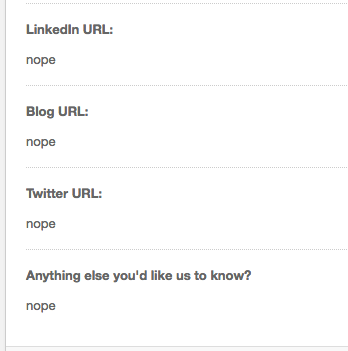
I understand this person might not have anything to put for these answers, but when you’re representing yourself and making a first impression, there’s a more professional way to do it. Simply writing out “I don’t currently have a LinkedIn account” sends a better message than “nope.”

Even though I think we’re quite fashionable at IMPACT, we’re far from being fashionista.com. Obviously, this person just copied and pasted the same cover letter from a previous job application.
At IMPACT, we’re looking for people who not only have the attention to detail but would also take the time to write out a personalized cover letter. That demonstrates to us a clear desire to work for IMPACT specifically, as opposed to just any ol' company that will hire them.
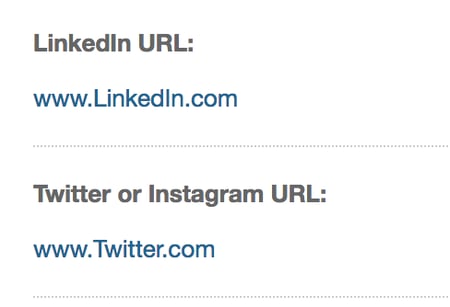
While technically this person did give me a LinkedIn URL and a Twitter URL, I would hope the right applicant would understand that we’re asking for links to their profiles, not the websites.
We recently started using Jobma, a video interviewing platform that will ask the applicant questions, record their answers, add it to their profile in our applicant tracking system, and notify us that the video is completed. Pretty cool, right?
Saying video is a huge part of our culture is an understatement. We need people who are passionate about video and are comfortable being on camera. (Or are at least willing to go outside of their comfort zone and try it!)
Some people even take themselves out of the process at this point -- possibly because they just don’t want to be on camera. While other people do submit videos only to find that they aren’t great on camera, or they simply didn’t answer the questions well.
Either through poor performance or self-elimination, adding video into our application process has helped us more effectively identify those who may not be the right culture fit for us.
This stage is a 30-minute live video interview with the applicant, and it’s our first chance to talk to them face-to-face.
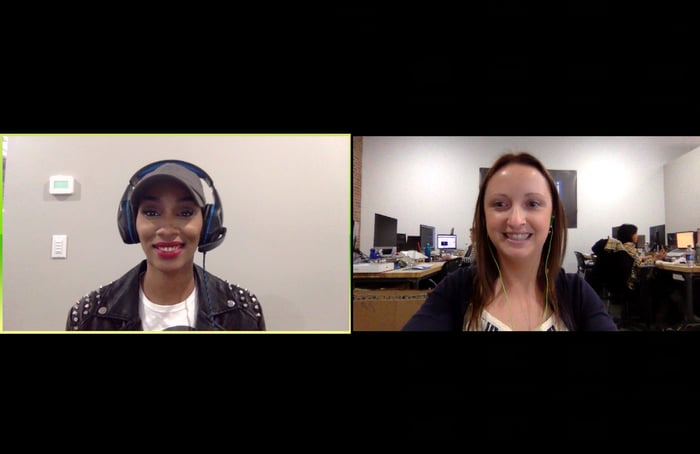
Me pretending (shh…) to have a video interview with Shandia Drummond, our sales operations specialist, just so I could set the tone for the 1-on-1 interview.
We recently re-named this the “culture interview,” because we dig deep with culture-driven questions to see if someone fits what we’re looking for.
For example, one of the questions we ask is:
This helps us to find out if they have self-awareness and a growth mindset, two things that are very important in the role they’d be taking.
During this stage, we take a regular part of the role and have the applicant complete it as if they were an IMPACT employee. For instance, when hiring someone for an account executive role, we have them perform a mock client call with one of our team members.
We need to see if they’re able to do the actual job and not just talk the talk.
While we do have a detailed rubric of things we’re looking for during this call, we’re also evaluating a few other things:
Meanwhile, our rubric is grading things such as communication skills, ability to challenge, active listening, etc., all of which are important not only in the role but also as an IMPACT employee.
Bob Ruffolo, our CEO, knows our culture better than anyone, and he wants to make sure we maintain it. During this call, he looks for any red flags we may have missed to avoid bringing anyone onto the team who isn’t a good fit.
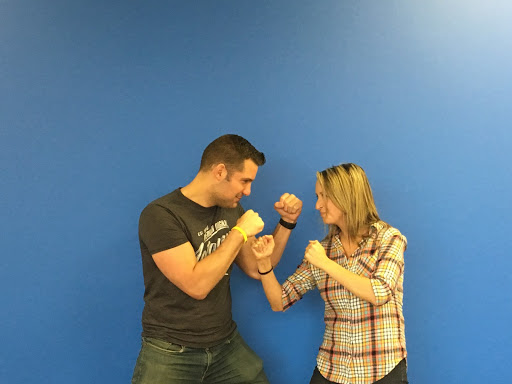
Bob and me just hanging out, trying to be good culture fits. 💥

"I feel personally responsible for every person we bring onto the team, so I want to meet everyone who is in the final stages of the interview process. This is my chance to give my own personal stamp of approval of skills and culture fit in a candidate. Over time, the hiring process and people have gotten so much better that I rarely have to veto any hires -- but it has happened in the past where I’ve seen things that other people missed."
Those vetos that Bob has done go to show how important it is to have another perspective on an applicant outside of the people they’ve already met with.
This hour-long video call includes the applicant and the team they’d be joining. During this call, the team is evaluating whether or not they see the person fitting into the culture of the company and their team. They ask questions about teamwork, working styles, and (generally) try to get to know their potential new teammate.
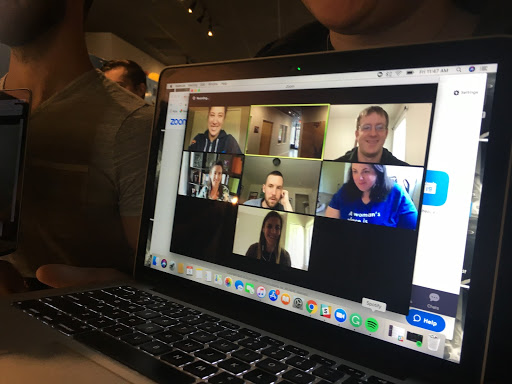
Part of our culture is giving team members a say as to who goes on their team, as opposed to just placing someone without input. This is the final stamp of approval before hiring someone.
We used to do an in-office visit -- in which candidates would visit our Connecticut headquarters in person -- but this has recently taken the place of that visit, due to new office construction.
As we’ve moved forward with this change, we’ve questioned whether or not to re-implement the visit even after we’re settled into our new office. While we do love meeting every person and getting to offer them a job in person, we’ve found that scheduling this trip only prolongs the process.
Not only that, but it seems to be harder and harder for applicants to find time for calls while they have a full-time job, let alone planning a trip to Connecticut if they're from out-of-state. Of course, the jury is still out on this change we've made. We’ll continue to see how this new process goes and solicit feedback from the people who are going through the process.
In addition to everything we’re looking for at each stage of the process, we’re also evaluating how the applicant interacts with people outside our structured interviews.
In my role, I interact with the applicants constantly in order to keep the process moving, send information, and answer questions. An “IMPACT-y” person would likely respond to each communication with a professional and friendly tone, whereas some applicants never respond at all and just move forward with scheduling their next interview.
That's not to say a lack of response every time is necessarily negative. Rather, it's an example of how we are always measuring and evaluating candidates -- and we recommend you do the same. Sometimes you'll learn a lot more about a candidate outside of those scheduled activities and conversations.
Strengthen Your Culture
Chapter 4
At each of the stages we outlined above, we work in various questions to test for attributes that are important in an IMPACT employee. Below you will find sample questions that test different qualification areas important to our company, as well as what we look to learn from the answers to those questions.
What you ask to determine culture fit should be tailored to the individual needs of your organization, as well as your core values. For example, one of the questions pertains to inbound marketing knowledge, and you may not be an inbound marketing-focused company. However, you should still look at that question and see how it can be adapted to your industry or niche.
While this isn’t a deal breaker, an affirmative answer shows that they’ve experienced the agency environment, which is typically very fast-paced and always changing. Not everyone is cut out for that kind of environment, so it’s great to hire people who already know what to expect and still are excited to be a part of it.
Pro-tip: If you have a slower-paced environment, you may want to consider creating a question that speaks to that scenario instead. Some candidates who may be qualified for the role you seek to fill may want something more agile and fast-paced than what you are offering.
This not only tells us if they fully understand inbound marketing, but also if they’re good at it. We’re looking for innovative campaigns that truly made an impact on the client’s business.
Pro-tip: Again, inbound marketing is our specialty as a company. Craft your question so it focuses not only on an understanding of your industry, but also measurable success in your industry, as well. Awareness of what you do does not always equate to future success in what you do.
When you’re passionate about something, you don’t clock out from work and stop thinking about it. You’re always trying to get better, stay on top of industry changes, and educate yourself through content, certifications, conferences, etc. We want people on our team who truly have a passion for marketing, and this is one way they can show it.
Pro-tip: This question is easily tailored to any business or organization. While passion may not be one of your core values, establishing a pattern of passion for what you do should be considered a highly desirable trait in a future hire.
This question came from IMPACT Design Supervisor Jessie-Lee Nichols:

“While we all have boundaries surrounding work, this usually told me a lot about their passion. The best candidates didn’t give an example about work -- it was a project at school, something they volunteer, etc., and it was usually a project they just got consumed in. You could see them light up when they talked about it, they went down rabbit holes, and in no way took the straight path to the finish line. These people were in it to win it until the work was done. They usually failed this one if they talked about a work project they were assigned, said they had to stop for an excuse of a reason, or if they couldn’t think of one.”
Analyzing someone’s dependability goes far beyond learning how often someone does something correctly; you can learn so much about how dependable someone is by having them tell you what happens after they do something wrong.
In a candidate's answer, we’re looking to see what this person did to fix their mistake, and how well they handled it. It’s a red flag if someone says they’ve never dropped the ball, even for something minor. This shows they either don’t take ownership of times that went wrong, or they’re not willing to be transparent about a failure.
Pro-tip: If the position you're filling is not client-facing, still ask some version of this question, even if it's focused more on dropping the ball for an internal team, manager, or peer-level employee.
It’s easy to observe from the sidelines when a team member does something wrong -- but instead, we’re looking to find people who decided to jump in and help. We’re all about helping each other at IMPACT, so if helpfulness isn’t a natural reaction to seeing someone in a tough situation, they probably aren’t a great fit.
Pro-tip: Again, if you aren't hiring for a client-facing role, adapt this question to be geared toward dropping the ball for an internal stakeholder or group of stakeholders.
We’re looking to see what a person values in a good client relationship. In addition, are they self-aware enough to know when things aren’t going well with a client? Listen to see if they own some of the fault, or if they blame it all on the client.
Pro-tip: There are a lot of ways you can customize this question to the different types of relationships a particular role of yours will need to manage. The goal here is to surface self-awareness of what works and what doesn't in a professional relationship, as well as a willingness to take responsibility when it is their fault that something isn't going well.
At times, we all may be asked to wear a few different hats beyond what we may have been hired to do. When so much is changing and we’re moving so fast, sometimes we have to pull in anyone who is available to help. It’s telling when someone can’t think of anything they’ve stepped in to do that went above the norm for them, simply to be helpful to the team as a whole.
Pro-tip: Listen closely to their tone, as well as any tells that someone felt "put out" by having to go above and beyond the call of duty in a certain scenario. Of course, there are always cases where someone is being asked to do more than they ever should have -- the key is to listen for the red flags of someone who is inflexible and will resent being asked to pitch in, as needed.
Listen for blame and/or simply pointing something out, as opposed to being proactive and helping to fix the problem.
Pro-tip: Do not add any sort of leading statement or question to imply you're looking for a scenario where they took action and provided a solution. We designed this question to be open-ended on purpose to see how a candidate would answer and react naturally.
Start by listing out the attributes your best people possess. Then do some brainstorming and research to match up the right questions or tests to assess each one. You may find that some questions require some tweaking or changing because they aren’t getting the right information -- and that’s perfectly normal.
For example, even though we use the questions above, we are still tweaking and optimizing them as we continue to evaluate the answers we receive.
Ready for More?
Chapter 5
Some questions might seem like a good idea to ask, but in reality, they don’t really get you anywhere with evaluating the applicant. Unless you have a solid reason for throwing questions like this, spare your applicants and leave them out.
Thinking back to my interview with IMPACT back in 2010, I distinctly remember one of the three questions I was asked -- we didn’t exactly have a thorough process back then -- was what type of music I listen to. While I was eager to say “90s pop,” I can guarantee they could have used a better question to gauge my skills for the job.
That said, I did just meet the Backstreet Boys...
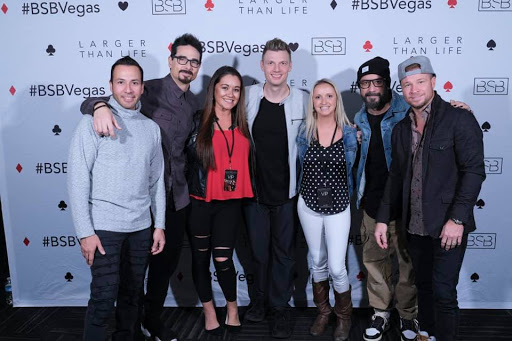
This is me fully utilizing our unlimited vacation to fly to Las Vegas and hang with the Backstreet Boys.
There are the questions you shouldn’t ask because they aren't helpful, and then there are the questions that are illegal to ask. When deciding on your list of questions, steer clear from anything that relates to the following:
It’s easy to accidentally ask an illegal question without realizing it. For instance, you might not be aware that asking an applicant when they graduated high school can be seen as a way of uncovering their age. To avoid this from happening, document all of your questions and double check that they don’t violate any of the rules.
Then, don’t let other questions sneak into the interviews just because it popped into your head.
Sometimes you might think you’re coming off as friendly, but in reality, it makes someone else feel uncomfortable. For example, you might just be trying to strike up a conversation about the team by saying:
However, you may make a candidate feel like they have to lie about their drinking in order to fit in, or that their drinking habits are something you’re evaluating them on. Instead, stick to questions that relate to the job at hand, not extracurricular activities.
Moms Matter
Chapter 6
It took a lot of trial and error -- and a willingness to critically evaluate and update our hiring processes (particularly in the culture fit area) -- but I feel so lucky to say that we have such an incredible team right now at IMPACT.
Because of that, there are a few benefits we’re lucky enough to experience -- and you can, too.
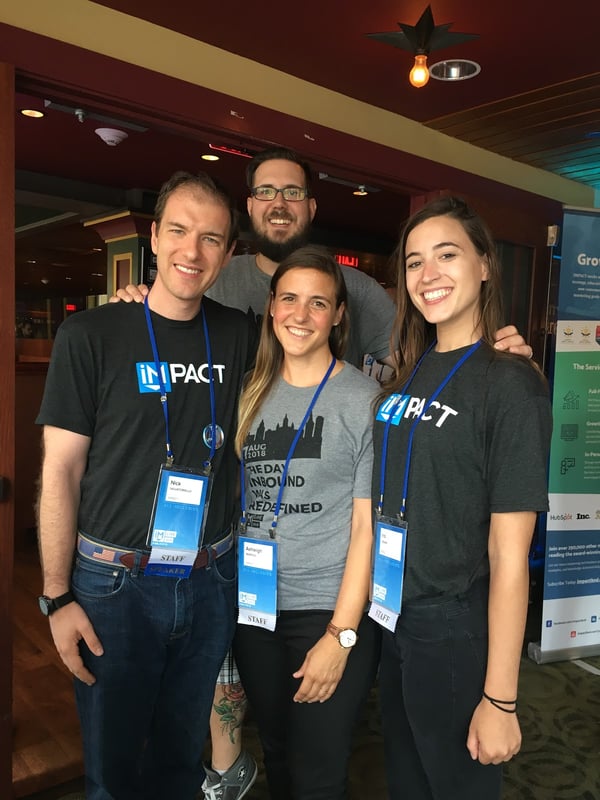
A happy bunch at IMPACT Live ‘18.
With dependability and helpfulness being two of our core values, it’s no wonder we’re able to go to anyone in the company for help and to get the answers we need. From onboarding new talent to working with clients, everyone in our team understands our standards of service and can be trusted to take on any project.

Looking beyond the blurriness, the insanity, and my face in this picture, it looks like we’re all having a pretty good time filming a social media video.
When you’re surrounded by people who are culture fits in a positive environment, it’s exciting to come to work. You know you’ll be pushed to get better without negativity or feeling out of place.
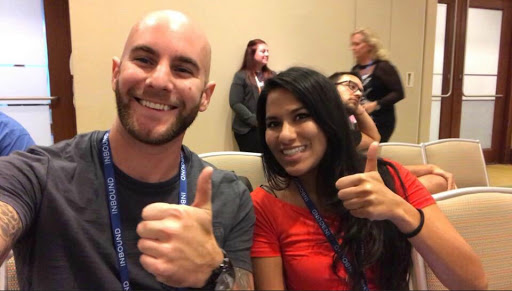
With everyone rowing in the same direction and aligned with our goals, it’s no wonder we’re able to celebrate success quite often. Whether small or big achievements, we all experience them as a team and are encouraged to share them as much as possible.
While it wasn’t an easy road to get the amazing team we have today -- and we will always need to work hard to maintain our company culture -- it’s worth all of the work and effort that has gone into building it. We’ll continue to improve our processes for selecting new people as we learn more about the people we’re hiring and our culture as a whole.
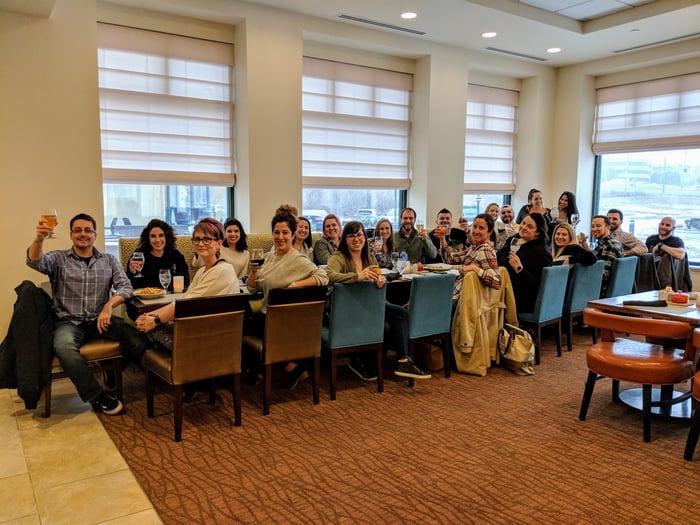
There’s no time like the present to get started on defining your culture and building your ideal team. Take it one step at a time and test things to see what works best for you. Before you know it, you’ll start to feel the positive shift in team morale, alignment, and overall team unity.
At IMPACT, we have revolutionized the way inbound marketing is done and taught to businesses. Find out how we can help you achieve incredible results by becoming the most trusted voice in your space.
Talk to us